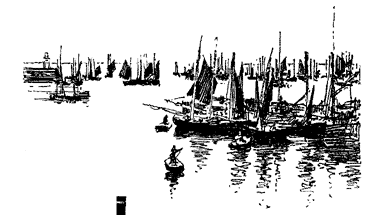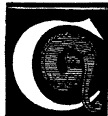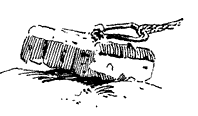
[From Manx Note Book, vol ii, 1886]

 ELTIC
SURNAMES FROM
ELTIC
SURNAMES FROM
TRADES OR OCCUPATIONS;
FROM DESCRIPTIVE NICK NAMES;
FROM DESIGNATIONS OF RESIDENCE OR BIRTHPLACE
CHAPTER III
THE Celtic Surnames of the Isle of Mann, which are derived from the profession or trade of an ancestor, or from some epithet indicating his personal characteristics or his local origin, are for the most part patronymic in from, having in their original documentary shape the prefix Mac. In the first place we shall enumerate the surnames which indicate the profession or rank in life of the ancestor of the family by which they are borne.
JOUGHIN, from MacJoughin, 'Deacon's son.'
'The priests sonnes that follow not their studies prove for the most part notorious theeves. For they that carry the name of MACDECAN, MACPHERSON, and MACOSPAC, that is the deane's or deacon's son, the parson's son, and the bishop's son, are the strongest theeves that be.'*
JOUGHIN is a purely Manx name. It is almost confined to the northern parishes.
McJOYCHENE,+ Mc JOYENE +, [1422], M'JOUGHIN [1430], MacJOGHENE [1570], JOUGHIN [1657], JOGHIN [1673].
Maughold, Bride, Andreas (c), elsewhere (u).
* Camden-Account of Ireland, P. 145.
+ These names are in the British
Museum copy only.
MACPERSON [1430] (extinct), and McPHERSON [1511] 'The Parson's son.' It is a common name in Scotland.
TAGGART, (sometimes pronounced TAGGARD), contracted from Mac-an-t-sagart, ' the Priest's son.'
In 1511, OTES MACTAGART is entered for the Mill of Doway. It was afterwards called Mullen Oates, now Union Mills, in the parish of Braddan.
Compare (Gaelic and Irish) MACTAGGART, MAC ENTAGGART.
MACTAGGART [1430], TAGHERTT [1540], TAGGART [1614], TAGERT [1660], TAGGARD [1681].
Malew (vc), Ballaugh, Braddan, Marown, Onchan, Maughold, Santon (c), elsewhere (u).
WARD, originally Mac-an-bhaird, the Bard's son.' , The sons of MAC-AN-BAIRD.'+
McWARD [1511], WARD [1660].
Very uncommon.
+ Four Mast., Vol. I., p. 609.
MACYCHLERY, the Clerk's son, has,in the Isle of Mann, been almost universally written in the English form of CLARK, CLARKE, or CLERK, but, though rare, the Manx form existed.
Compare (Irish) UA CLEIRIGH, which became O'CLERY.
CLERK is derived from the Latin clericus, the name formerly given to those who possessed the accomplishments of reading and writing.
Conchobar UA CLEIRIGH, lector of Cill-dara,' A.D. 1126.1
John CLERK was judge of Mann in 1417.
'Gubon M'Cubon CLEARKE, commissary to Bishop Pulley, Bishop of Sodor,' A.D. 1430.2
CLERK [1417], CLEARKE [1430], M'CLEARY [1521] CLARK [1521]. CLARKE [1586], MAC Y CHLERY [1617],
Jurby, Andreas, Lezayre, Bride, German, Malew, Arbory (c), elsewhere (u).
1 Four Mast. Vol., II. p. 996.
2 Statute Law Book, p. 24
SKELLY, contracted from O'Scolaidhe, the story-teller's descendant,' (sceulaidhe). The story-teller was a regular official at the courts of the old Irish kings. + O'SCOLAIDHE of Sweet stories.'1
Gilia-Isa-MAC-AN-SKEALY,' A.D. 1237.2
After the English Invasion the family of O'SCOLAIDHE or O'SCOLAIGHE, now SCULLY, were driven into the county of Tipperary. 3
Compare (Irish) SCULLY, SKELLY, SKALLY,and SCALLY.
McSCALY [1408], SKELLIE [1630], SKEALLEY [1631], SKALLY [1640], SKELLY [1677], SKALY [1715].
It was formerly a common name in Jurby, but is now scarcely found anywhere..
1 O'Dubhagain, p. 12.
2 Four Mast., Vol. III., p. 291.
3 O'Donovan, p. 25.
KEWISH (pronounced KEOUSH), contracted from Mac Uais, 'the noble's son.'
Colla UAIS was the 121st Milesian Monarch of Ireland.
KEWISH [1618], KEVISH [1653], KEWESH, [1683].
Jurby (vc), Bride, Ballaugh, Malew (u), elsewhere (w).
BREW, contracted from MacVriew, 'the judge's son.'
The Vriew,' now the Deemster, the Scandinavian term having superseded the Celtic, gave 'Breastlaws' to the people. He was identical with the Irish Brehon. It is possible that BREW may be contracted from MacBrugaidh, 'the farmer's son.'
BREW is a purely Manx name.
Compare (Irish) MACBREHON, now universally translated JUDGE.
McBROW [1408], McBREWE [1417], BREW [1616]. BRIEW [1648], BREW [1660].
Andreas, Lonan, Santon (vc), Ballaugh, Maughold, Lezayre, Malew, Onchan (c), elsewhere (u).
GILL and GELL, contracted from Giolla, 'a young man,' (see MYLCHREEST, KILLEY,) are almost certainly the same name originally, the former being the earlier form. They are now used indiscriminately.
Very little doubt can exist of the Irish having had, in early times, the word Gilla for a youth, servant boy, or lacke),: and the name of GILLA or GILDAS, uncompounded, is certainly more ancient than the Danish invasions.'*
After King Magnus Barfod fell in battle in Ulster in A.D. 1103 an Irishman named HARALD GILLE came forward and passed himself off for a son of that Monarch by an Irishwoman; and, after proving his descent by walking over a red hot iron, actually became King of Norway.+
GILL was Prior of Furness in A.D. 1134.
Compare (Irish) GILL, (Gaelic) MACGILL and MACKILL.
GILLE[1134] MAcGYLLE [1430], McGELL[1504],McGILL, GELL [1511].
GILL.-Santon, German, Lezayre (c), elsewhere (u).
GELL.-Rushen (vc), Marown, Malew, Patrick, Santon (c), elsewhere (u).
TEAR and TEARE, contracted from Mac-an-t-saoir, ' the carpenter's son.'
'Ciaran MAC-AN-TSAIR, A.D. 990.'§
The importance attached by the Act 5, Ed. IV. (see introductory chapter)to the bearing of an English surname soon induced many of the less distinguished Irish families, of the English Pale, and its vicinity, to translate or disguise their Irish names, so as to make them appear English ; thus MAC-AN-T-SAOIEL was altered to CARPENTER.",
Compare (Gaelic) MACINTYRE, MACTIER, (Irish) MACENTIRE, MACATEER, MATEER, TEER, TIER.
MACTYR [1372],*M'TEARE, M'TERRE [1504], MACTERE [1511], TEARE [1599], TEAR [1611], TERE [1688].
It is much commoner in the north of the Island than the south.
Ballaugh, Jurby (vc), Maughold, Andreas, Bride, Lezayre, (c), elsewhere (u).
O'Donovan, p. 55.
+Worsaae, p. 346.
~ Chron. Scot., p. 233.
++ O'Donovan. Introduction, p. 26.
** Manx Society, Vol. XXIII., P. 392.
GAWN and GAWNE, contracted from Mac-an-Gabhain, ' the smith's son.'
The smith, in olden times, was a very important personage, as being the maker of armour and weapons, and as this trade, like others, in that day descended from father to son its designation would soon become used as a surname.
MacFlrbis states in his book of Genealogies that the MAC-AN-GHOBHAN were historians to the O'Kennedys of Ormond.
'Maelbrighde MAC-AN-GHOBIIANN,' A. D. 1061.*
Henry GAWEN was "Atturney" in 1517.
Compare (Irish) McGOWAN, GOWAN, GAVAN, (Gaelic) McGAVIN, (English) SMITHSON.
MacGAWNE +[1422], M'GAWEN, M'GAWN[1430],GAWEN [1517], GAWNE, [1586], GAWN [1599], GOWN [1601].
Malew, Rushen (vc), Jurby, Ballaugh, Arbory (c), elsewhere (u)
Four Mast., Vol. II, p. 881.
+ In the British
Museum copy only.
.
CLAGUE and CLEG, contracted from MacLiaigh, 'the leech's son,' (Liagh, Leech).
In the T'ain B'o Cuailitge, a Fiith-Laig, or prophet Leech, heals the wounds of Chchulaind, after his fight with Ferdiad. It is probable, therefore, that in Pagan times the Liag (leech) belonged to the order which may be conventionally called Druidic, and that charms and incantations formed part of the means of cure. The position assigned to the Leech by the laws in the middle ages was a very high one. He ranked with the smith and the Cerd, or artist in gold and silver; and the Ollamh, or doctor in leech-craft, ranked with an Aire Ard i.e. one of the highest grades of lord. He had also a distinguished place at assemblies, and at the table of the king. Leech-craft became hereditary in certain families, some of whose names indicate their profession, as O'LEB, i.e. O'LIAIGH.' 1
'MACLIAG, Chief Poet of Erinn, A.D. 1014.'2
Gilla MACLIAG (Gelasius), the son of Rory, the successor of St. Patrick, and Primate of Armagh and of all Ireland died A.D. 1173.' 3
In 1405, Gilbert CLEG receives letters of protection from Henry IV. to come to the Isle of Mann.4 It is possible, but not probable, that the forms CLEG and CLEGG may be derived from (ON) kleggi, 'a horse fly.'
The word Cleg, is used in the Isle of Mann, as well as in Scotland and the north of England, to designate this insect. CLAGUE is now the commonest form, but did not become so till early in the eighteenth century.
CLEG [1405], MACCLEWAGE, MACCLUAG [1511], CLEVAGE [1521], CLOAGGE, CLOAGE [1601], CLAIGE [1622], CLOGUE [1625], CLEAGE 1644, CLAUGE [1652], CLAGUE [1655], CLOAUGE [1660], CLUAGE [1673], CLOIAGE [1674], CLUAG[1676], CLAIG [1696], CLAIGUE [1702], CLOAG [1719], CLAGE [1775],CLEGG [1790].
Marown, Santon (vc), Malew, Michael, Jurby, Lezayre, Ballaugh, Braddan, Lonan, Maughold, Rushen (c), elsewhere (u).
1 Ency. Brit. Art. on Celtic Literature.
2 Chron. Scot., P. 257.
3 Four Mast., Vol. Ill., p. 13.
4 Manx Society, Vol.
VII., P. 231.

|
|
||
|
Any comments, errors or omissions
gratefully received The
Editor |
||